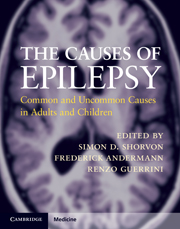Section 2 - Idiopathic epilepsy
Published online by Cambridge University Press: 05 March 2012
Summary
- Type
- Chapter
- Information
- The Causes of EpilepsyCommon and Uncommon Causes in Adults and Children, pp. 43 - 112Publisher: Cambridge University PressPrint publication year: 2011
- 1
- Cited by

